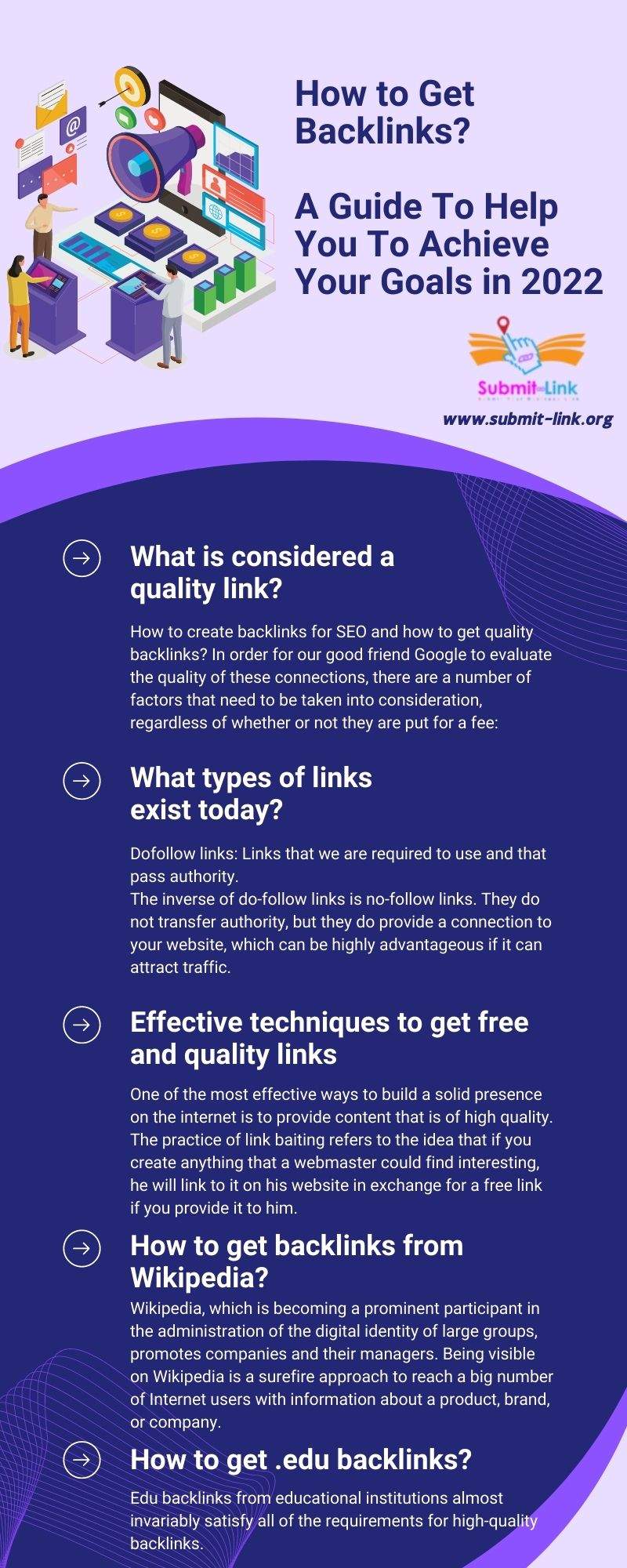Introduction
When beginning a new venture, it is extremely important to work on acquiring high-quality backlinks for any existing websites. You are already aware that links are an essential part of the strategy since they enable us to increase the authority of our website and improve our search engine optimization. In the course of our quest for connections, also known as backlinks, we frequently place an emphasis on quantity rather than quality. This can be harmful to the long-term health of our website. It is a regular mistake, and as we indicated earlier, it can result in a penalty from Google.
What is considered a quality link?
How to create backlinks for SEO and how to get quality backlinks? In order for our good friend Google to evaluate the quality of these connections, there are a number of factors that need to be taken into consideration, regardless of whether or not they are put for a fee:
- The web page to which we will add the link should be relevant to our topic.
- The anchor text we will utilize should be as natural and varied as feasible.
- The link should be positioned as far up on the page as possible.
- The longer a website has existed, the greater its credibility should be.
- Check the reputation of your domain, as it is probable that Google has penalized some of them.
What types of links exist today?
Dofollow links: Links that we are required to use and that pass authority.
The inverse of do-follow links is no-follow links. They do not transfer authority, but they do provide a connection to your website, which can be highly advantageous if it can attract traffic.
Sponsored links: These are used to denote links that have been purchased or developed as part of an advertising campaign. Today, we do not recommend adding this attribute to links, as it gives Google the appearance that you are purchasing links to boost your website’s ranking.
UGC links: Links that represent user-generated content, hence the acronym for User Generated Content. That is, those found in blog comments or user-generated content on message boards.
Effective techniques to get free and quality links
One of the most effective ways to build a solid presence on the internet is to provide content that is of high quality. The practice of link baiting refers to the idea that if you create anything that a webmaster could find interesting, he will link to it on his website in exchange for a free link if you provide it to him. Providing discounts or holding contests is one of the most effective methods for increasing the number of external links that point to a website. You can accomplish this by contributing as a “guest blogger” on websites that allow “guest authors.” However, you will need to keep a close eye on the quality of the pages you contribute to. It is possible to run into media sources who are unwilling to jump through hoops without receiving the monetary rewards; as a result, it is essential to engage both personally and professionally with webmasters.
How to get backlinks from Wikipedia?
Wikipedia, which is becoming a prominent participant in the administration of the digital identity of large groups, promotes companies and their managers. Being visible on Wikipedia is a surefire approach to reach a big number of Internet users with information about a product, brand, or company. When a website or brand is mentioned on a Wikipedia page, two key events take place. One of these events is the optimization of the website’s ranking on search engines. The other event is increased traffic to the website. Registration as an editor on Wikipedia enables the creation of new pages and the modification of existing ones. This can be augmented by the creation of “backlinks” to one or more sites, leading to a rise in popularity.
Tips:
- Serve as a consistent editor of the encyclopedia.
- Apply to develop a Wikipedia article that does not yet exist.
- Utilize the services of a growth hacking agency.
How to get .edu backlinks?
Edu backlinks from educational institutions almost invariably satisfy all of the requirements for high-quality backlinks. You might try looking for research sites; there are likely to be many backlinks and websites catering to a specific specialty that have resources that are eager to link to your website. Think about approaching students who have blogs with .edu domains as well. They will be happy to be of assistance to you.
Conclusions
How to get backlinks? You should know how to generate backlinks and optimize SEO for every platform. If you don’t measure the quantity and quality of these websites, a successful link-building strategy can harm your company. If you want to get a backlink, avoid connections and act naturally to avoid being penalized. Link development takes time and patience to earn a backlink. Be consistent, and you’ll notice results over time. If you have any questions left or any doubts, feel free to contact us and we would be glad to help you or guide you in this journey.
References
https://www.monsterinsights.com/how-to-get-backlinks/
https://www.semrush.com/blog/how-to-get-backlinks/
https://neilpatel.com/blog/how-to-build-backlinks/
https://seochatter.com/how-to-get-backlinks-from-wikipedia/
https://www.wordstream.com/blog/ws/04/27/09/wikipedia-do-follow-links
https://monitorbacklinks.com/blog/seo/edu-backlinks
https://isotropic.co/how-to-get-edu-backlinks-4-5-methods-that-work/
Infographic:
![]()
SUBSCRIBE to our Newsletter & get our FREE PDF course on "How to Increase Traffic in your Website". Instant delivery!



